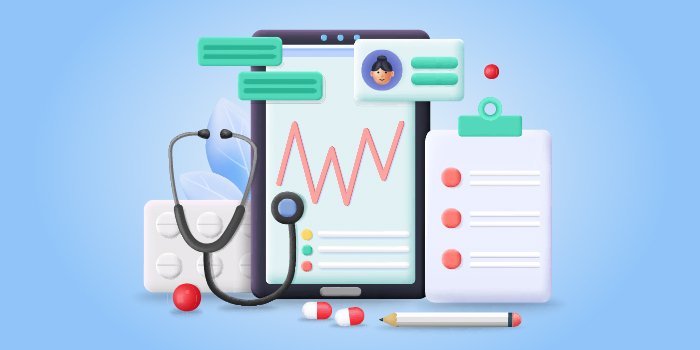A Complete Guide to Transforming Patient Management Systems with AI Tools
The rise of Patient Management Systems (PMS) has fundamentally changed how healthcare providers manage patient care and streamline operations. However, with the growing demand for efficient workflows, personalized care, and enhanced outcomes, traditional systems need a technological upgrade. Integrating Artificial Intelligence (AI) tools into these systems offers advanced automation, predictive analytics, and real-time insights, transforming the way healthcare organizations operate. This guide explores how AI tools are reshaping Patient Management Systems, overcoming challenges, and driving the future of patient care.
Understanding the Evolution of Patient Management Systems:
The Limitations of Traditional Patient Management Systems
Traditional Patient Management Systems were designed to handle basic administrative tasks, such as scheduling, billing, and managing patient records. Although effective at streamlining operations to some extent, these systems often rely heavily on manual data entry, making them prone to human error and inefficiencies. Furthermore, they struggle to integrate with the growing number of health data sources, such as wearable devices, laboratory results, and telehealth platforms. This limitation hinders the ability of healthcare providers to offer real-time, patient-centered care.
These systems also lack advanced analytics capabilities, meaning that healthcare providers must manually interpret data to make decisions, which can lead to delays and suboptimal outcomes. Without predictive tools, traditional PMS cannot anticipate potential health risks or recommend timely interventions. As healthcare becomes more data-driven, these shortcomings highlight the need for AI-powered solutions.
How AI is Transforming Patient Management Systems
AI tools have the potential to address the limitations of traditional Patient Management Systems by automating routine processes, enhancing data accuracy, and providing actionable insights. AI-powered systems are capable of learning from data patterns, predicting patient needs, and delivering personalized care recommendations. For example, predictive analytics can help healthcare providers identify patients at risk of developing chronic conditions, allowing for early interventions.
AI tools also enable seamless integration with multiple data sources, consolidating information from EHRs, lab results, and wearable devices into a single platform. This real-time data aggregation ensures that healthcare providers have a comprehensive understanding of a patient’s health, improving the accuracy of diagnoses and the effectiveness of treatment plans. According to Accenture, AI-powered healthcare solutions could save the U.S. healthcare industry $150 billion annually by 2026 through improved operational efficiency and enhanced patient care.
Key AI Features Enhancing Patient Management Systems:
Automated Scheduling and Appointment Management
Automated scheduling is a critical feature of AI-enhanced Patient Management Systems. These systems can identify open time slots, schedule appointments, and send automated reminders to patients, reducing the likelihood of no-shows. By optimizing appointment management, AI ensures that healthcare providers can make the most of their time and resources. AI tools also allow patients to reschedule or cancel appointments via automated chatbots, providing greater flexibility and convenience.
Automated scheduling not only improves patient engagement but also reduces administrative workloads. With fewer missed appointments and optimized schedules, healthcare providers can increase their operational efficiency while enhancing patient satisfaction.
Predictive Analytics for Risk Assessment
Predictive analytics is another transformative feature of AI-powered Patient Management Systems. These tools analyze historical and real-time data to identify patterns that indicate potential health risks. For example, an AI system can detect early signs of heart disease by analyzing a patient’s medical history, lifestyle factors, and biometric data from wearable devices. By identifying at-risk patients, healthcare providers can offer proactive care and reduce hospital readmissions.
AI’s predictive capabilities are particularly valuable for managing chronic conditions such as diabetes and hypertension. These tools can forecast complications before they occur, enabling healthcare providers to adjust treatment plans in advance. Gartner reports that predictive analytics in healthcare has resulted in a 30-40% improvement in patient outcomes, underscoring the value of AI in proactive care management.
Natural Language Processing for Documentation
Documentation is a time-consuming aspect of healthcare, often taking time away from direct patient care. AI tools that leverage Natural Language Processing (NLP) address this issue by converting voice or text input into structured patient records. With NLP, healthcare providers can document patient interactions in real-time, eliminating the need for manual data entry and reducing errors.
NLP tools also enhance the quality of clinical documentation by ensuring consistency and completeness. This improves communication between healthcare providers and ensures that critical patient information is accurately recorded. Additionally, NLP tools integrated into Patient Management Systems can generate summaries and insights from unstructured data, such as physician notes, further enhancing decision-making capabilities.
Real-Time Data Integration and Decision Support
AI-powered Patient Management Systems integrate data from multiple sources—EHRs, lab reports, wearable devices, and telehealth platforms—into a unified platform. This comprehensive view of patient data enables healthcare providers to make informed decisions quickly and accurately. Real-time integration ensures that all relevant information is available at the point of care, improving the coordination and quality of healthcare services.
AI tools also offer decision support by providing recommendations based on the latest clinical guidelines and patient-specific data. For example, an AI system can recommend personalized treatment plans for cancer patients by analyzing genetic profiles and previous treatment outcomes. Real-time data integration and decision support enhance both the efficiency and effectiveness of healthcare delivery.
Automated Billing and Claims Management
Billing and claims management are essential but often complex processes in healthcare. AI tools streamline these processes by automating the generation of invoices, verifying insurance coverage, and managing claims submissions. By reducing manual intervention, AI-driven systems minimize errors and ensure timely reimbursements. AI tools also detect inconsistencies in claims, preventing financial losses due to incorrect billing.
The automation of billing processes frees up administrative staff to focus on higher-value tasks, improving overall operational efficiency. Healthcare Automation Software ensures that these processes run smoothly, reducing the burden on healthcare providers and enhancing financial management.
Overcoming Challenges in AI-Powered Patient Management Systems:
Addressing Data Privacy and Security Concerns
Data privacy is a significant concern when implementing AI in Patient Management Systems. Healthcare organizations must comply with regulations such as HIPAA to ensure that patient information remains secure. AI tools offer advanced security features, including encryption, access controls, and real-time monitoring, to protect sensitive data. AI for Enterprise solutions provide additional safeguards by ensuring compliance with regulatory standards and monitoring for unauthorized access.
Integrating AI with Legacy Systems
Many healthcare organizations still rely on legacy systems that are not easily compatible with AI tools. Integrating AI into these existing systems can be challenging and may require significant time and resources. However, enterprise solutions offer interoperability features that enable seamless data flow between old and new systems. Successful integration ensures that healthcare providers can leverage AI tools without disrupting their operations.
Training and Adoption for Healthcare Providers
The successful implementation of AI-driven Patient Management Systems requires proper training and change management. Healthcare providers must be comfortable using new technologies to maximize the benefits of AI. Continuous training programs and user-friendly interfaces can facilitate the adoption of AI tools, ensuring smooth transitions and high system utilization.
Best Practices for Implementing AI in Patient Management Systems
- Assess Existing Systems and Identify Gaps: Begin by evaluating your current PMS to determine where AI tools can add value.
- Select AI Tools that Align with Organizational Goals: Choose AI solutions that address specific challenges, such as reducing wait times or improving care coordination.
- Leverage Enterprise Solutions for Integration and Scalability: Use AI for Enterprise platforms to ensure seamless integration with existing systems and support future growth.
- Train Staff and Monitor System Performance: Provide continuous training and track system performance to optimize workflows.
- Continuously Optimize and Scale the System: Collect feedback from users and make improvements to ensure that the system evolves with your organization’s needs.
The Future of Patient Management Systems
The future of Patient Management Systems lies in further automation, personalization, and interoperability. AI-powered virtual assistants will play a more prominent role, providing patients with real-time support and personalized care recommendations. Predictive analytics will become more sophisticated, enabling healthcare providers to anticipate patient needs and offer preventive care.
Healthcare Automation Software will continue to streamline administrative processes, while AI for Enterprise solutions will ensure that healthcare organizations can manage large volumes of data securely and efficiently. Deloitte predicts that by 2030, over 70% of healthcare organizations will adopt AI-powered PMS, driven by the need for more efficient care delivery and better patient outcomes.
Conclusion:
The integration of AI tools into Patient Management Systems is transforming healthcare by enhancing operational efficiency, personalizing care, and enabling data-driven decisions. AI-driven PMS ensures seamless coordination between healthcare providers and patients, improving outcomes and satisfaction. Organizations that embrace AI and Healthcare Automation Software are better positioned to meet future healthcare demands efficiently. The future of healthcare is smarter, faster, and more patient-centric, with AI at the core of patient management innovation.














